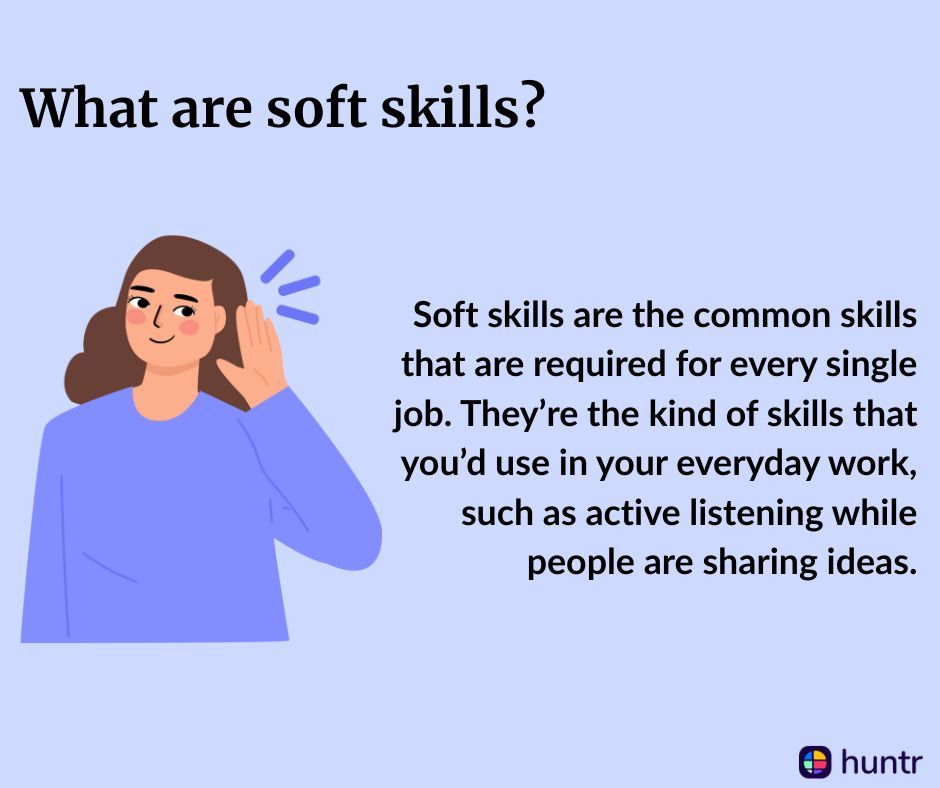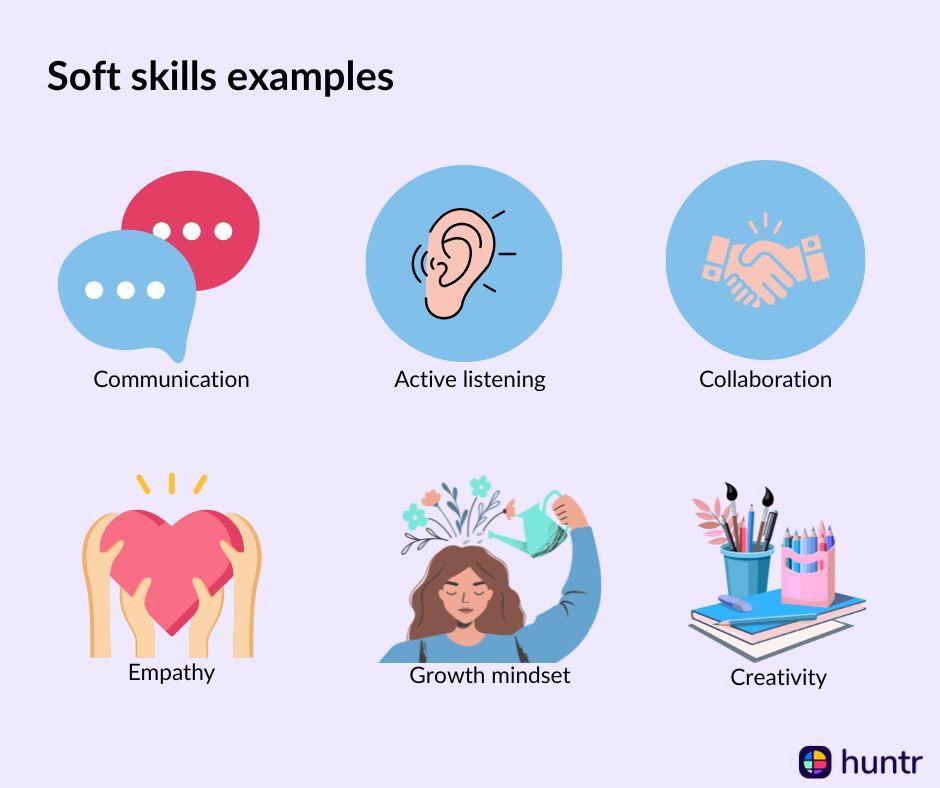Huntr Blog
20 Soft Skills Examples to Add to Your Resume in 2025
February 23, 2024
Most employers choose to hire people based on a mix of their hard skills and soft skills. You might be the best person to do a job technically, but if you have terrible communication skills, you might get overlooked for a position. Hiring managers don’t only want someone who can do a great job, they also want someone who’s easy to work with. And that’s where soft skills come in. Highlighting soft skills on your resume will help you showcase your personality to employers. In this article, we’re going to share some soft skills examples you can add to your resume.
Want to find more soft skills examples?
Sign up for Huntr to access even more skills that you can add to your resume in only a couple of clicks.
What are soft skills?
Soft skills are the common skills that are required for every single job. They’re not related directly to your role, but are generally appreciated by most employers. Soft skills are the kind of skills that you’d use in your everyday work, such as active listening while people are sharing ideas.

What’s the difference between soft skills and hard skills?
Soft skills are skills aligned with personality traits, whereas hard skills are directly related to your job. For example, a content creator would have content creation as a hard skill, whereas their soft skill would be creativity.
How to improve soft skills
1. Accept feedback
When your soft skills are poor, you’re probably going to hear about it. People will typically confront you about personality traits that could be improved upon. Having a growth mindset means taking in that feedback, even when it’s hard to hear, and being willing to work at it. Investing in your education to grow from feedback gives you an advantage to become a better and more well-rounded person.
2. Learn from others
When someone has great soft skills, you’ll probably notice it easily. You might like being around that person or notice how everyone gravitates towards them. You can pick their brain on how they developed that skill, so you can get insight in how to improve yourself in that area. Alternatively, you can read books about soft skills on topics like communication, team work, negotiation, and more. Plus, there are often online courses that can teach you to be better at these things. So, looking for resources online from those who’ve mastered these skills will help you improve your own soft skills.
20 Soft Skills Examples to Add to Your Resume in 2025
1. Communication
Communication skills are the most common soft skills needed to thrive in a work environment. A person with poor soft skills in communication might be abrasive, complain frequently, negative, or indirect. A great communicator is someone who communicates their ideas clearly, honestly, and with empathy. They’ll likely have good use of eye contact, have natural pauses, use their body language to communicate, and will be engaged in the conversation.
2. Active listening
Active listening is one of the most underrated soft skills examples. Think about how easy it is to get lost in a thought in your head when someone else is speaking. Most people spend their time coming up with their own response while someone else is communicating their thoughts rather than listening to them. A good active listener will allow someone to communicate their idea and then pause to think about a response after the person completes their train of thought.
3. Collaboration
Collaboration is one of the soft skills all about working well with others towards a united goal. When team members aren’t aligned and there’s in-fighting about alignment, it’s harder to actually get the work done necessary to achieve the success the team is after. A good collaborator will find ways to get everyone on the same page to work for a common goal by including everyone in the decision making process and making people feel heard.
4. Tactfulness
Tactfulness is a soft skill related to communication. Most communicators tend to be either direct or indirect in how they communicate. When people communicate directly, sometimes it can be perceived as abrasive. The person hearing this communication style may feel uncomfortable, overwhelmed, or anxious by this communication style. Tactfulness is all about communicating directly but with a bit of kindness and empathy to the person on the receiving end. It’s not about shutting down the conversation, it’s just a method for communicating hard feedback a bit better.
5. Conflict resolution
Soft skills like conflict resolution are all about keeping the peace when dealing with disagreements. Disagreements are part of life. But when you get stuck in a disagreement it can destroy team dynamics and relationships at large. Sometimes, a philosophy of “disagree and commit” ends up being more productive to help resolve a conflict.
6. Empathy
Empathy is one of the soft skills examples people look for when hiring. People often want to work with highly empathetic people who show concern and regard for their feelings. Being able to connect with someone on an emotional level can help you overcome interpersonal problems with ease. People in roles, such as leadership, HR, recruiting, diversity and other people-oriented positions often require high levels of empathy to be effective in their roles.
7. Adaptability
Companies often tell employees that they’re required to thrive on change. Small to medium-sized businesses often grow the fastest and an ability to adjust to constant changes in team dynamics, company culture, work processes, and so on is a necessary soft skill to be able to succeed in your role. Hiring professionals with strong soft skills alongside technical abilities ensures a more cohesive, agile team.

8. Growth mindset
A growth mindset is a belief that you can change, learn, and evolve. You don’t believe your personality is fixed. You can change yourself in any way to become a better person, to become smarter, or to grow in new ways. A growth mindset is a soft skill that encourages learning and growth. It’s about knowing you can improve upon your weaknesses, can learn anything with time and dedication, and can become a better version of yourself with time. Tech companies often hire people with growth mindsets.
9. Critical thinking
One of the most philosophical soft skills examples is critical thinking. Being able to spot inconsistencies in a story or recognizing that something doesn’t quite add up is crucial to developing this soft skill. A person who’s developed critical thinking will be able to analyze information to determine its validity instead of blindly believing everything they’ve been told.
10. Foresight
Foresight is a soft skill that people develop through years of experience and dedication to their craft. The deeper your knowledge in an industry, the more likely you are to recognize patterns, predict trends, and plan for the future. There may be new tools, trends, obstacles that popup in your industry, but those with foresight will be able to recognize which ones have staying power and which ones are a fad. They’ll be able to make strategic decisions based on their work history from seeing things change and evolve over time.
11. Creativity
Soft skills like creativity are all about looking at a problem, tool, task, or situation from a unique perspective. It’s about seeing other angles or possibilities for what could be done. Creative people can reimagine something. They might come up with unique ideas or innovative tools. To develop creativity you need to learn as many different things as you can so your brain can forge unique connections with things.
12. Decision-making
Decision-making is a soft skill example that’s all about being able to get all the facts you need, evaluate them, and make an informed decision as a result. It’s not just about making a random decision, it’s also about being able to get all the information you need to ensure you make the right one. Being able to gather facts and perspectives is crucial. Once you have all the information, you need to commit to your decision to see it through. Decisive people won’t stay on the fence as they’ve got the experience to evaluate facts thoroughly to help them make the right choice.
13. Leadership
Soft skills like leadership are all about guiding, mentoring, and influencing others with your presence, experience, and character. Not all bosses are leaders. And not all leaders are found in leadership roles. To embody leadership as a soft skill, you’ll need to communicate well, delegate tasks, listen to people’s needs, help others grow, and be empathetic to the people around you.
14. Relationship-building
Relationship-building is a soft skill that allows you to build rapport and have a positive relationship with others. It’s about creating more positive relationships with the people around you. You’ll need to have emotional intelligence to build positive relationships, actively listen to people, have a high level of empathy, communicate well, and uplift the people around you. Helping people get along with others can play a role in your ability to build relationships across teams.
15. Negotiation
Negotiation skills involve a high level of communication to help come to a solution that works for all parties involved. Whether you’re negotiating a deal for a client, trying to negotiate your job offer, or negotiating who does what chore at home, the key to achieving success will boil down to active listening to determine what all parties involved need to move forward. You might need to manage expectations, practice patience, and you’ll definitely require some emotional intelligence to succeed as a negotiator.
16. Work ethic
To develop soft skills like work ethic, you’ll need to work hard, dedicate time to your craft, master self-discipline, collaborate well with others, be determined to see something through, and make good use of your time. Of course, life is all about work-life balance. But having a strong work ethic during the work portion of that balance allows you to achieve greater things in life. While work can feel like a drag at times, knowing how to motivate yourself with minimal rewards will help ensure that you succeed in ways that others don’t. All work, no play will imbalance you. But having a good work ethic can allow you to grow and evolve as a person.
17. Time management
We all have the same 24 hours in a day. How we divide those hours will determine what you achieve, who you become, and how you grow. Time management skills are soft skills that can be crafted through your calendar. From building habits around exercise, education, sleep, and more you’ll be able to become a more productive person, healthier, and wiser. There’s always something new you can learn or do, and finding ways to incorporate those things into your day will showcase how well you’ve mastered this soft skill.
18. Presentation skills
In work environments, we often have to present ideas or data to the people we work with. A good presenter is someone who has gravitas, a commanding presence, speaks articulately, and excites people with the information they share. You can develop presentation skills through programs like ToastMasters, asking people for feedback, or presenting information in different ways every time you present to see what lands with people.
19. Positivity
Having a positive attitude is a great soft skill, and one that’s appreciated by others. Being upbeat, enthusiastic, and optimistic about what you’re working on and what you hope to accomplish can help uplift the people around you. It’s not about pretending things are fine when they’re not. Instead, it’s about looking at things with an optimistic lens. People with positive attitudes are more likely to solve problems effectively, spread kindness at work, and work well with others.
20. Organization skills
Soft skills like organization are all about the ability to manage your time, prioritize tasks, and follow through to achieve goals set. You can also use a freelance daily planner that provides a tactile system to structure deadlines, track priorities, and break down objectives into actionable steps. Whether you're trying meeting deadlines, delegating tasks, or planning ahead, organized people tend to get stuff done on time because of their organization skills. They know when they need more support and they know how to get it. They plan ahead so that they can meet deadlines. And overly, they keep things moving and growing.
How to add soft skills to your resume
If you’re currently working on your resume, you can use Huntr’s AI resume builder to help you add soft skills to your resume in only a couple of clicks. You can use a resume tailor to find the soft skills included in job descriptions for the companies you’re applying to, which Huntr filters automatically so you can easily add relevant, job-specific soft skills to your resume with ease. To build your resume and add soft skills to it, sign up for Huntr today!
Get More Interviews, Faster
Huntr streamlines your job search. Instantly craft tailored resumes and cover letters, fill out application forms with a single click, effortlessly keep your job hunt organized, and much more...
AI Resume Builder
Beautiful, perfectly job-tailored resumes designed to make you stand out, built 10x faster with the power of AI.
Next-Generation Job Tailored Resumes
Huntr provides the most advanced job <> resume matching system in the world. Helping you match not only keywords, but responsibilities and qualifications from a job, into your resume.
Job Keyword Extractor + Resume AI Integration
Huntr extracts keywords from job descriptions and helps you integrate them into your resume using the power of AI.
Application Autofill
Save hours of mindless form filling. Use our chrome extension to fill application forms with a single click.
Job Tracker
Move beyond basic, bare-bones job trackers. Elevate your search with Huntr's all-in-one, feature-rich management platform.
AI Cover Letters
Perfectly tailored cover letters, in seconds! Our cover letter generator blends your unique background with the job's specific requirements, resulting in unique, standout cover letters.
Resume Checker
Huntr checks your resume for spelling, length, impactful use of metrics, repetition and more, ensuring your resume gets noticed by employers.
Gorgeous Resume Templates
Stand out with one of 7 designer-grade templates. Whether you're a creative spirit or a corporate professional, our range of templates caters to every career aspiration.
Personal Job Search CRM
The ultimate companion for managing your professional job-search contacts and organizing your job search outreach.

